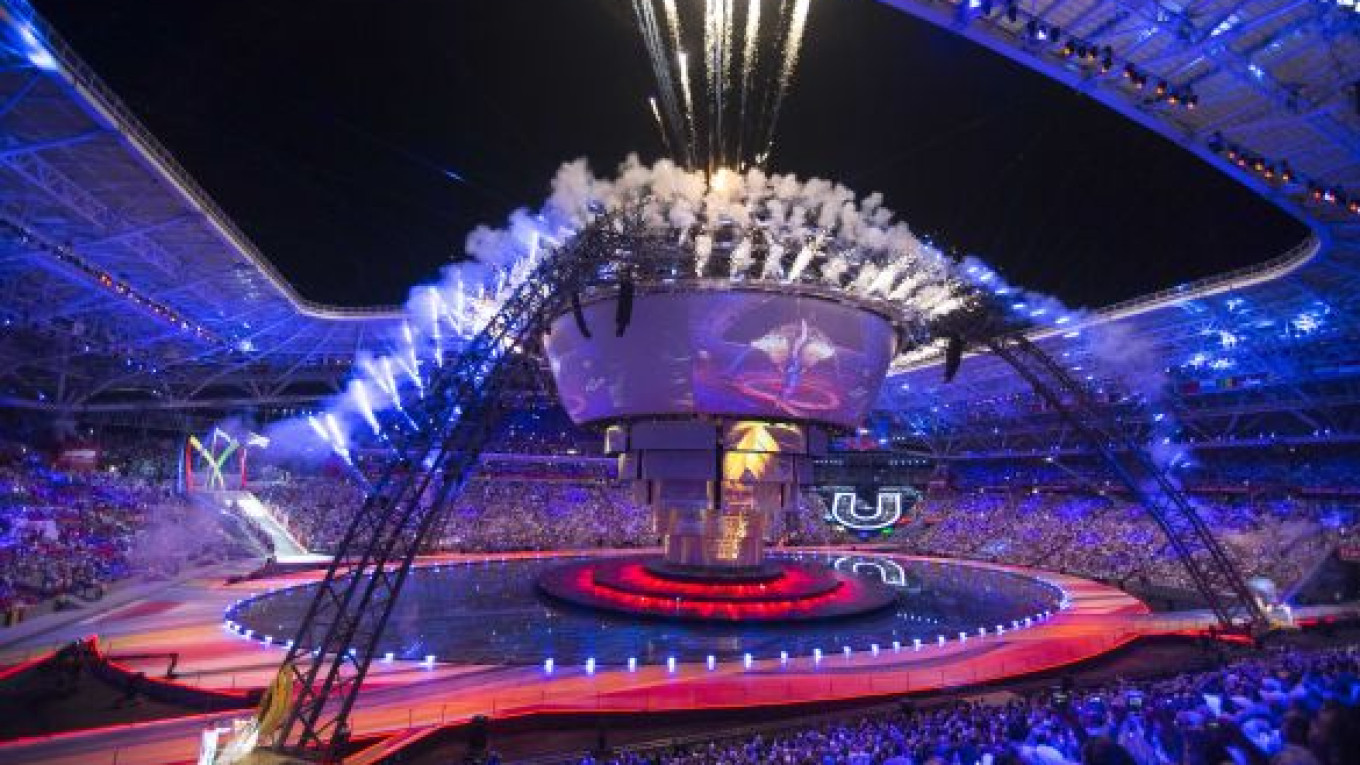President Vladimir Putin officially opened the 27th Summer Universiade in Kazan with 1,000 performers, the lighting of the Universiade Flame and an impressive fireworks display on Saturday, telling the crowd of 45,000: “We did all we could so participants of this sports festivity could feel at home here and achieve outstanding results.”
The Universiade is the first large-scale multi-sport event held in modern Russia and is often referred to as the “test” or “prelude” to the upcoming Winter Olympic Games, which will be held in the Southern city of Sochi in February 2014.
The government spared no effort to ensure this test will be successful, launching a complete overhaul of Kazan's infrastructure at a cost of $6.8 billion. This sum has yielded a new football stadium, an aquatics palace, a series of highways and many other facilities built in the capital of Russia's largely Muslim region of Tatarstan.
“For Tatarstan, this event represents another chance to show its special status among Russian regions and use its policy of trading this status in exchange for Moscow's federal subsidies,” said Rais Suleimanov, the head of the Kazan-based Volga Center for Regional and Ethno-Religious Studies.
The Republic of Tatarstan enjoys its own constitution, which defines it as a sovereign state united with the Russian Federation. In the early 1990s, Tatarstan was resolute in separating itself from the rest of Russia, even trying to join the CIS as one of its founding members.
In 1994, the republic signed an agreement with the Kremlin for the delimitation of authority between Kazan and Moscow, diminishing Tatarstan's contributions to the federal budget.
But as the federal government exhibited its determination to quell separatism, Tatarstan's leadership became increasingly reluctant to reassert its own independent status, with then-President Mintimer Shaimiyev even co-founding the pro-government United Russia party in 2001.
The new bond with Russia was reinforced and signified by the Kazan Millennium celebrations of 2005 with the Qol Sharif mosque, which was destroyed by Ivan the Terrible in the 16th century during the siege of Kazan and rebuilt in the middle of Kazan's Kremlin.
“Tatarstan has mastered an original way of profiting from its sovereignty, but as it gets more resources from Moscow, it loses its right to ask for more,” Suleimanov said.
Security measures have been significantly increased during the games after Doku Umarov, a Chechen insurgency leader and Russia's most wanted man, called for the use of “maximum force” to stop the Olympic Games in Sochi.
According to Suleimanov, security services went so far as to cancel driving licenses for some drivers on false pretexts in order to minimize traffic during the event.
A spokeswoman for the local branch of the Internal Affairs Ministry, Irina Nizhelskaya, denied the report, saying by phone that “security measures are being enforced within the framework of the law.”
In contrast to the North Caucasus, Tatarstan has generally been seen as an example of the peaceful settlement of interreligious cleavages in modern Russia.
But this image was brought into question last July, when Tatarstan's top Muslim leader, Ildus Faizov, miraculously survived three bomb blasts that destroyed his car in Kazan in the first major attack against a religious leader outside the North Caucasus. Minutes earlier, a former aide to Faizov was shot dead by gunmen in the Volga city.
The apparently coordinated attack, which took place a day before the start of the holy Muslim month of Ramadan, raised fears that Islamic radicalism had spread to the more secular Muslim regions of central Russia.
But as Kazan welcomes student athletes from around the world with its newly cleaned streets and glowing sports facilities, the city is more concerned with a new task: putting forward the image of a new, diverse and prosperous Russia.
Contact the author at i.nechepurenko@imedia.ru
Related articles:
A Message from The Moscow Times:
Dear readers,
We are facing unprecedented challenges. Russia's Prosecutor General's Office has designated The Moscow Times as an "undesirable" organization, criminalizing our work and putting our staff at risk of prosecution. This follows our earlier unjust labeling as a "foreign agent."
These actions are direct attempts to silence independent journalism in Russia. The authorities claim our work "discredits the decisions of the Russian leadership." We see things differently: we strive to provide accurate, unbiased reporting on Russia.
We, the journalists of The Moscow Times, refuse to be silenced. But to continue our work, we need your help.
Your support, no matter how small, makes a world of difference. If you can, please support us monthly starting from just $2. It's quick to set up, and every contribution makes a significant impact.
By supporting The Moscow Times, you're defending open, independent journalism in the face of repression. Thank you for standing with us.
Remind me later.


